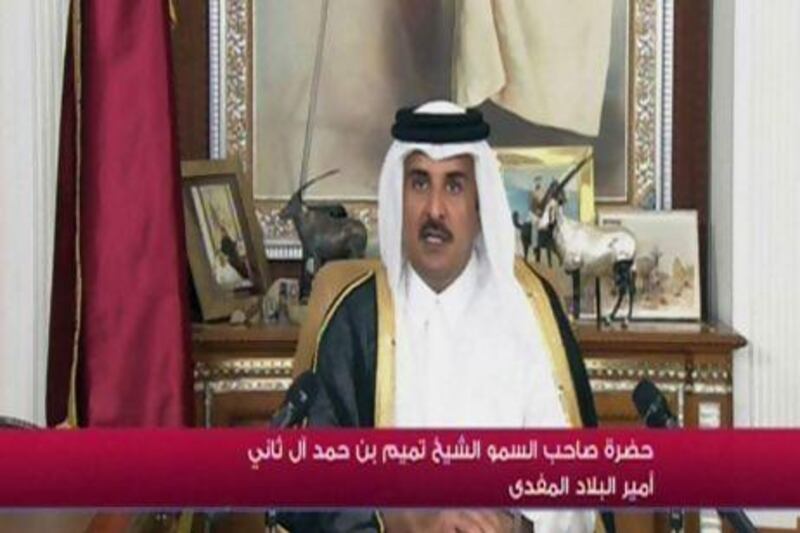DOHA // Qatar will retain its independent foreign policy, support the sovereignty of all Arab lands and seek to diversify its gas-based economy, the new emir said yesterday.
In his first speech as head of state, Sheikh Tamim bin Hamad Al Thani, 33, said he would follow the path of his father Sheikh Hamad, architect of the modern Qatari state, who on Tuesday became the first modern Arab leader to abdicate.
Sheikh Mohammed bin Zayed, Crown Prince of Abu Dhabi and Deputy Supreme Commander of the Armed Forces, had met Sheikh Tamim at the Emiri Court in Doha earlier in the day.
He conveyed the regards of the President, Sheikh Khalifa, and the Vice President and prime minister and Ruler of Dubai, Sheikh Mohammed bin Rashid.
Sheikh Tamim's 15-minute address focused on regional and domestic issues, including the "challenge of diversifying income and investing for future generations".
"We don't take direction and this independent behaviour is one of the established facts," he said.
The emir said Qatar would respect "the sovereignty and integrity of all Arab lands".
"Qatar is committed to the struggle of the Palestinian people to gain their legitimate rights and deem gaining these rights a condition for achieving a just peace," he said.
This "includes Israeli withdrawal from all Arab lands occupied in 1967, including East Jerusalem, as well as the establishment of a Palestinian state and the right of return for Palestinian refugees. There is no settlement without a just peace."
The emir made no direct mention of the conflict in Syria, where Qatar backs rebels fighting to topple Bashar Al Assad.
Sheikh Tamim said Qatar "rejects divisions in Arab societies on sectarian lines". "We seek to preserve relations with all governments and countries and we respect all sincere, active and effective political directions in the region but we do not support one side over the other," he said.
"We respect all the influential and active political trends in the region, but we are not affiliated with one trend against the other. We are Muslims and Arabs who respect diversity of sects and respect all religions in our countries and outside of them."
Later yesterday the emir formed a new government, which does not include the former prime minister and foreign minister Sheikh Hamad bin Jassim Al Thani, who in his 21 years in office had become the face of Qatari foreign policy.
Sheikh Hamad bin Jassim did not hesitate to take the lead among Arab states, most notably in the Libyan and Syrian uprisings. Qatar was militarily involved in the Nato operations in Libya that led to the eventual overthrow of Muammar Qaddafi, and actively supports rebels fighting to topple Mr Al Assad. The new emir split the positions held by Sheikh Hamad, naming Sheikh Abdullah bin Nasser bin Khalifa Al Thani prime minister and interior minister, with Khaled Al Attiyah promoted to foreign minister.
"The appointment of the new prime minister, who possesses a strong domestic portfolio, certainly shows that the new emir is keen to focus on domestic issues and to develop the country internally," said Michael Stephens, a researcher at the Royal United Services Institute in Doha.
Mohammed Al Sada retained the post of energy minister, a key position in the emirate, the world's largest exporter of natural gas.
The cabinet also included a woman, with Hessa Al Jaber becoming communication minister.
Sheikh Ahmed Bin Jassim Al Thani resigned as director of the government-controlled Al Jazeera television network, a post he had held for two years, to become minister of economy and trade in the new cabinet.
* Reporting by Reuters, Agence France-Presse and Wam





